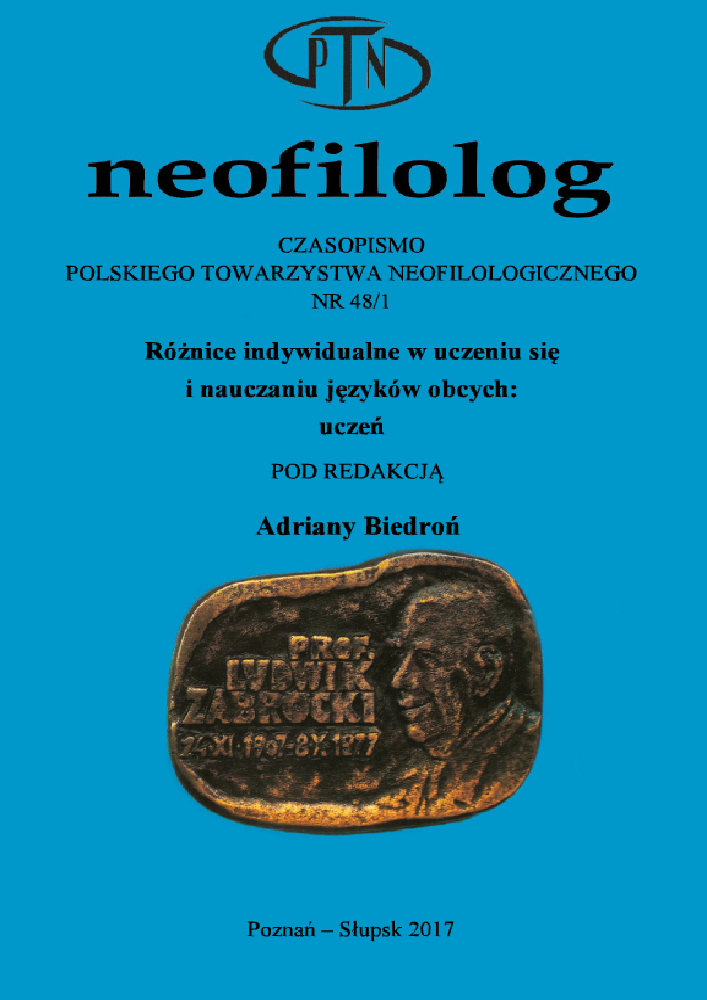Résumé
Research on subjective (implicit) theories, similarly to studies on other kinds of beliefs, has a rich tradition in the SLA field. This study presents the results of a survey conducted among 55 Romance Philology students, containing open-ended questions about different aspects of the language learning process: nature of the language itself, learner's personal attributes facilitating learning, effective learning activities, optimal learning environment, obstacles to learning, role played by other people. Due to the use of a qualitative methodology (open-ended questions), a large variety of different answers was collected. The data were analysed and divided into subject categories, and the answers falling into each category were counted in order to provide an overall view of the group's tendencies. The students' answers mainly confirm that they see learning a language as a long process demanding time and effort. Students' motivation and perseverance prove to be the most important factors whereas features such as intelligence or language aptitude are underestimated.
Références
Arnold, J., Brown, H. D. 1999. „A map of the terrain”. (w) Affect in language Learning. (red. J. Arnold). Cambridge: Cambridge University Press, str. 1-24.
Barcelos, A. M. F. 2003. „Researching Beliefs About SLA: A Critical Review”.(w) Beliefs about SLA. (red. P. Kalaja i A. M. F. Barcelos). Dordrecht: Springer, str. 7-33.
Biedroń, A. 2008. Attribution related affects in second language acquisition. Słupsk: Akademia Pomorska.
Blackwell, L. S., Trzesniewski, K. H., Dweck, C. S. 2007. „Implicit theories of intelligence predict achievement across an adolescent transition: A longitudinal study and an intervention”. Child Development, 78(1): 246-263.
Dörnyei, Z. 2005. The Psychology of the Language Learner. Individual Differences in Secod Language Acquisition. New Yersey – Londyn: Laurence Erlbaum Associates, Publishers Mahwah.
Dweck, C. S., Chiu, Ch., Hong, Y. 1995. „Implicit Theories and Their Role in Judgments and Reactions. A World From two Perspectives”. Psychological Inquiry, 6, 4: 267-285.
Horwitz, E. K. 1988. „The beliefs about language learning of beginning university foreign language students”. Modern Language Journal, 72(3): 283-294.
Kalaja, P. i A. M. Ferreira Barcelos. (red.). 2003. Beliefs About SLA. New Research Approaches. Dordrecht: Kluwer.
Kelly, G. A. 1955. The psyhology of personal constructs. New York: Norton.
Kuntz, P. S. 1996. Beliefs about language learning: the Horwitz model, University of Wisconsin-Madison, http://files.eric.ed.gov/fulltext/ED397649.pdf, DW 08.12.2016.
Martinez, H. 2008. „The subjective theories of student teachers: Implications for teacher education and research on autonomy”. (w) Learner and Teacher autonomy. (red. T. Lamb i H. Reinders). Amsterdam: Benjamins, str. 103-124.
Michońska-Stadnik, A. 2013. Teoretyczne i praktyczne podstawy weryfikacji wybranych teorii subiektywnych w kształceniu nauczycieli języków obcych. Wrocław: Wydawnictwo Uniwersytetu Wrocławskiego.
Mori, Y. 1999. „Epistemological beliefs and language learning beliefs: What do language learners believe about their learning?” Language Learning, 49 (9): 377-415.
Pudo, D. 2016. „Représentations du français et d’autres langues étrangères chez les étudiants de philologie romane”. Romanica Cracoviensia, 16 (4): 249-263.
Rubacha, K. 2008. Metodologia badań nad edukacją. Warszawa: Wydawnictwa Akademickie i Profesjonalne.
Ryan S., Mercer, S. 2012. „Implicit Theories: Language Learning Mindsets”. (w) S. Mercer, S. Ryan i M. Williams (wyd.) Psychology for Language Learning, Palgrave Macmillan: 74-89.
Smuk, M. 2016. Od cech osobowości do kompetencji savoir-être – rozwijanie samoświadomości w nauce języków obcych. Lublin – Warszawa: Werset.
van der Slik, F. W. P., van Hout, R. W. N. M., Schepens, J. J. 2015. „The Gender Gap in Second Language Acquisition: Gender Differences in the Acquisition of Dutch among Immigrants from 88 Countries with 49 Mother Tongues”. PLoS ONE 10(11): e0142056. https://doi.org/10.1371/journal.pone.0142056, DW 08.08.2017.
Wilczyńska, W., Michońska-Stadnik, A. 2010. Metodologia badań w glottodydaktyce. Wprowadzenie. Kraków: Avalon.
Licence
© Dorota Pudo 2017

Ce travail est disponible sous licence Creative Commons Attribution - Pas de Modification 4.0 International.
Auteurs :
Les auteurs de textes acceptés pour publication dans la revue Neofilolog sont tenus de remplir, signer et renvoyer à l'adresse de la rédaction, un accord sur l'octroi d'une licence gratuite pour les œuvres, avec obligation d'accorder une sous-licence CC.
En vertu de cet accord, les auteurs des textes publiés dans la revue Neofilolog accordent à l'Université Adam Mickiewicz de Poznań une licence non exclusive et gratuite et permettent l'utilisation de la sous-licence Creative Commons Attribution-NoDerivatives 4.0 International (CC BY-ND 4.0).
Les auteurs se réservent le droit de disposer librement de l'œuvre.
Utilisateurs :
Les utilisateurs d'Internet intéressés ont le droit d'utiliser les œuvres publiées à partir de l'année 2017 sous réserve des conditions suivantes :
- reconnaissance de la qualité d'auteur - l'obligation de fournir des informations sur la qualité d'auteur, le titre, la source (liens vers l'œuvre originale, DOI) et la licence, ainsi que l'œuvre distribuée ;
- sans créer d'œuvres dérivées - l'œuvre doit être conservée dans sa forme originale, p. ex. les traductions ou les interprétations ne peuvent être distribuées sans le consentement de l'auteur.
Tous les textes publiés sont soumis au droit d'auteur.
Autres :
L'Université Adam Mickiewicz de Poznań se réserve le droit à la revue dans son ensemble (mise en page, forme graphique, titre, conception de la couverture, logo, etc.).
.
